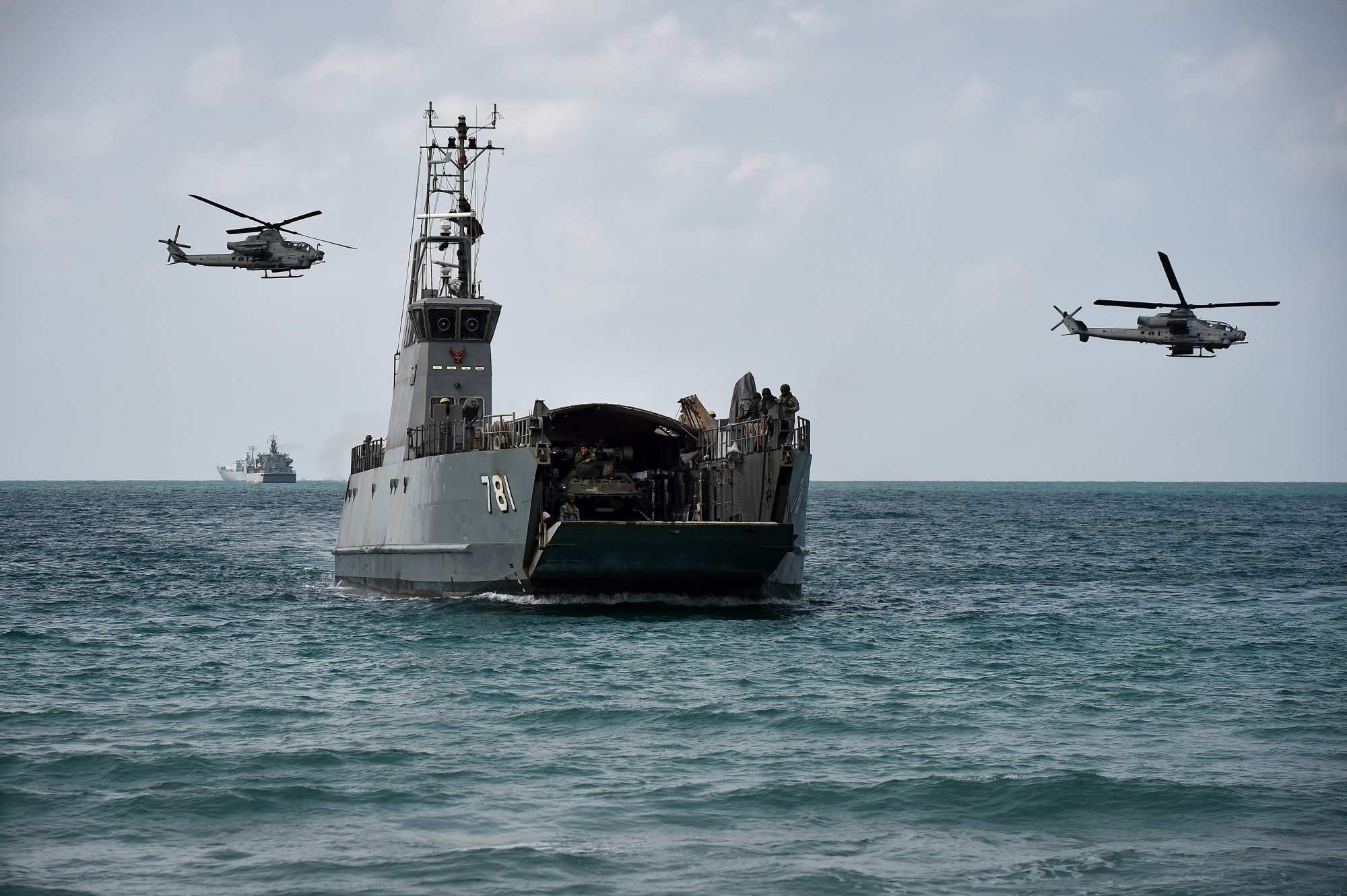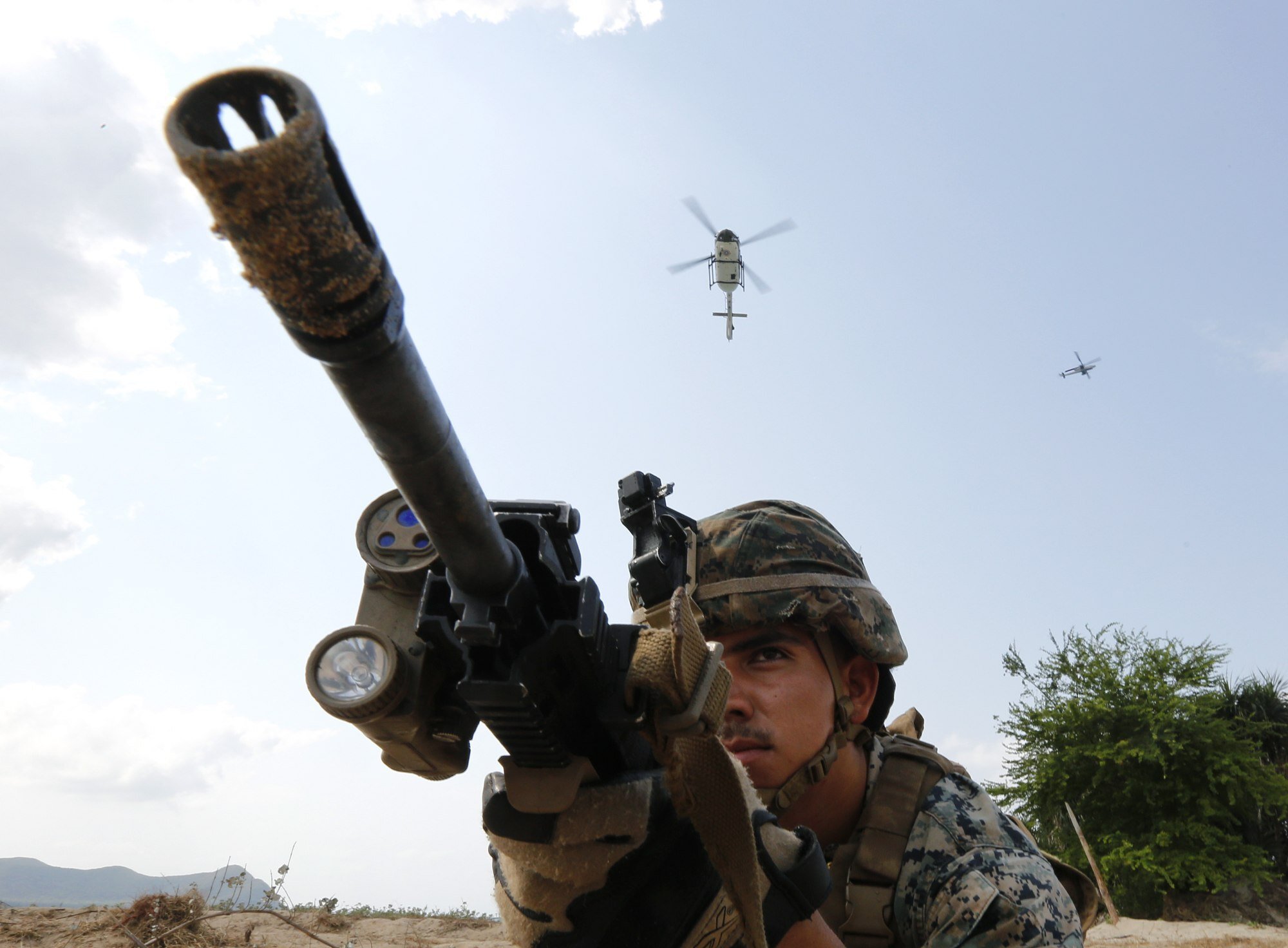
Bangkok’s China ties in focus as US-Thailand ‘Cobra Gold’ military drills return – but smaller
- The once-massive Cobra Gold exercises had to be scaled back again this year because of the pandemic, raising questions about their waning importance
- But analysts say the multinational drills are still a useful diplomatic tool for Washington, as Bangkok increasingly turns to Beijing for arms purchases
Some 3,460 personnel, about a third of the pre-pandemic figures, will take part in this year’s Cobra Gold, including 1,953 Thai troops and 1,296 Americans, it was announced at a Thai military press conference earlier this month joined by the US Chargé d’Affaires Michael Heath.
Of the 20 countries involved, Singapore, Japan, Indonesia, South Korea and Malaysia will also send troops to join the exercises, while China, India and Australia will join humanitarian and civic projects like building school facilities in rural parts of Thailand.

China has joined in a humanitarian and civic assistance capacity since 2014. Myanmar, which took part as an observer every year between 2015 and 2020, will be absent as its military rulers face censure over the worsening political and humanitarian crisis sparked by their coup last year.
Paul Chambers, a security expert at Thailand’s Naresuan University, said Myanmar would not receive an invitation unless it “restores some sort of democracy and improves human rights”.
Bangladesh, Canada, France, Britain, Mongolia, Nepal, New Zealand, the Philippines, Fiji and Vietnam will join the Multinational Planning Augmentation Team, a contingency exercise to strengthen multinational military cooperation in a non-war capacity.
The latest Cobra Gold comes amid a warming of Thailand-US ties, which were on ice following the 2014 coup that first brought Thai Prime Minister Prayuth Chan-ocha to power.
“Were it simply a bilateral military exercise, I am not convinced that it would have been held in the aftermath of the May 2014 coup d’etat,” said Zachary Abuza, a professor at the National War College in Washington.
“But overall, it is an important exercise, and it’s a way to bring in other countries as observers in order to socialise them and build up some trust. For example, Vietnam has been an observer since 2016. This has built up trust, and gotten them more comfortable in operating in multilateral exercises.”

Thailand – the US’ oldest treaty ally in Asia – has since grown closer to China even as it continued hosting Cobra Gold, which before the pandemic was known for its unrivalled size and extent, the wide range of weaponry on show and the use of live rounds.
This year, key exercises like amphibious landing, civilian evacuation and live-fire have been dropped from the war games due to Covid-19 restrictions.
A useful tool
Questions have been asked about the waning importance of the drills amid the pandemic-induced scaling back that also clouded its 40th anniversary last year.
A symbol of the state of Thailand-US relations, Cobra Gold further signifies the US’ changing security roles in the Indo-Pacific, particularly in the face of Bangkok’s growing ties with Beijing.
The US cannot afford to skip the exercises completely, however. “[It] is one of the few tools we have to shape Thai politics right now,” Abuza said.
“There is no [US] ambassador [to Thailand], and senior leaders in the past year have bypassed the kingdom. The lack of engagement only reinforces the Thai leadership’s pro-Beijing stance,” he said. “Unfortunately the [US-Thai] alliance continues to wane, as the two sides have very differing perceptions of threat.”
I think China watches Thailand now the way a snake watches a mouse in its cage, with patience
This year’s Cobra Gold also comes as arms deals between Thailand and the US look to be picking up. The Thai Air Force announced earlier this year that it plans to buy four F-35 stealth jets made by US defence manufacturer Lockheed Martin worth 13.8 billion baht (US$426 million) as soon as October – and could order as many as eight, the air force chief was quoted as saying.
The budget for the jets has reportedly been approved, unlike the Thai Navy’s request for 22.5 billion baht to buy two more Chinese submarines, which was postponed for two years after it came under heavy public scrutiny for being extravagant spending on security during a pandemic.
Tim Cahill, Lockheed Martin’s senior vice-president for Global Business, told Reuters this week that Thailand had expressed interest in the stealth fighters, but said there was “nothing official” and that it would ultimately come down to “a US government policy decision”.
One of the world’s most advanced fighter aircraft, the F-35 is considered a highly sensitive export and sold only to the United States’ closest allies. In the Indo-Pacific region, only Australia, Japan, South Korea and Singapore fly the jet.
Hedging ties
Thailand not only hosts military exercises for the US and its allies, however, it also takes part in drills with China.
“[It] is important to remember that all services of the Royal Thai Armed Forces have exercises with the People’s Liberation Army counterparts,” Abuza said.
“Since 2014, the Thai leadership has clearly been hedging. Some Thai military leaders that I have spoken with now question the utility of Cobra Gold, unclear of what they get out of it, especially vis-à-vis their bilateral relationship with the US.”
“Thailand has become increasingly dependent on China for its major arms purchases, including submarines, surface warfare ships, tanks, armoured personnel carriers,” Abuza said, adding that the US now accounts for a diminishing portion of the Royal Thai Air Force’s weapons imports.
“I think China watches Thailand now the way a snake watches a mouse in its cage, with patience.”
Chambers from Naresuan University said that Cobra Gold and other annual exercises like “Cooperation Afloat Readiness and Training (CARAT) for the Thai and US navies; Balance Torch for US and Thai Special Forces, as well as the annual multilateral, air force exercise called COPE Tiger … are ways in which the US can show off new military equipment while showcasing the public display of Thailand and the US together.”
“What’s more, Beijing can watch the exercises to learn more about US weaponry,” he said. “At the moment, Bangkok is trying not to depend too much on either country and not tilt too close to either side. This is one reason Bangkok chooses to continue military exercises with, obtaining military purchases from and receiving military academy education from both the US and China.”

